The Industrial Metaverse May Be Closer Than You Think
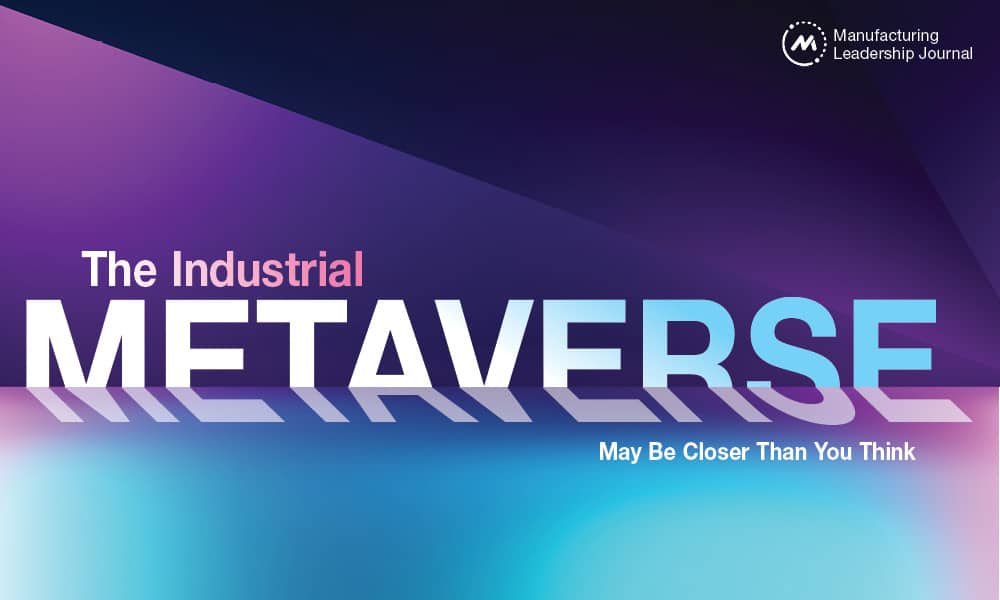
Nearly 80% of manufacturing executives seem confident that the metaverse will transform aspects of manufacturing in the next five years, a new Deloitte/MLC study reveals.

TAKEAWAYS:
● Executives say that the Industrial Metaverse offers new ways to solve a variety of pressing challenges they face in the near term.
● Attracting and retaining top talent and building resilience and visibility in supply chains are top goals.
● Among the chief challenges with the Industrial Metaverse are cybersecurity, data protection and IP, brand, and safeguarding personal information.
In May 2023, Deloitte and the Manufacturing Leadership Council (MLC) embarked on a study to better understand the industrial metaverse and its applications in manufacturing. This article presents some of the key highlights from the resulting publication “Exploring the industrial metaverse” (referred to as “the study” in this article), including findings that the majority of manufacturers surveyed are already progressing on their industrial metaverse journey and are deriving benefits from even partial adoption.
A Paradigm Shift
The industrial metaverse is the convergence of individual technologies that, when used in combination, can create an immersive three-dimensional virtual or virtual/physical industrial environment. As technology evolves, the industrial metaverse will likely allow access to these immersive 3D environments from any internet-connected device, including virtual reality (VR) and augmented reality (AR) devices, as well as smartphones, tablets, laptops, and equipment, from anywhere in the world.
A majority of manufacturing executives surveyed[1] are bullish on the potential of the industrial metaverse in the near term. More than 70% of surveyed executives believe that in the next five years it will have a high rate of adoption in the manufacturing industry. Nearly 80% are confident that the metaverse will transform R&D, design, and innovation and enable new product strategies.[i]
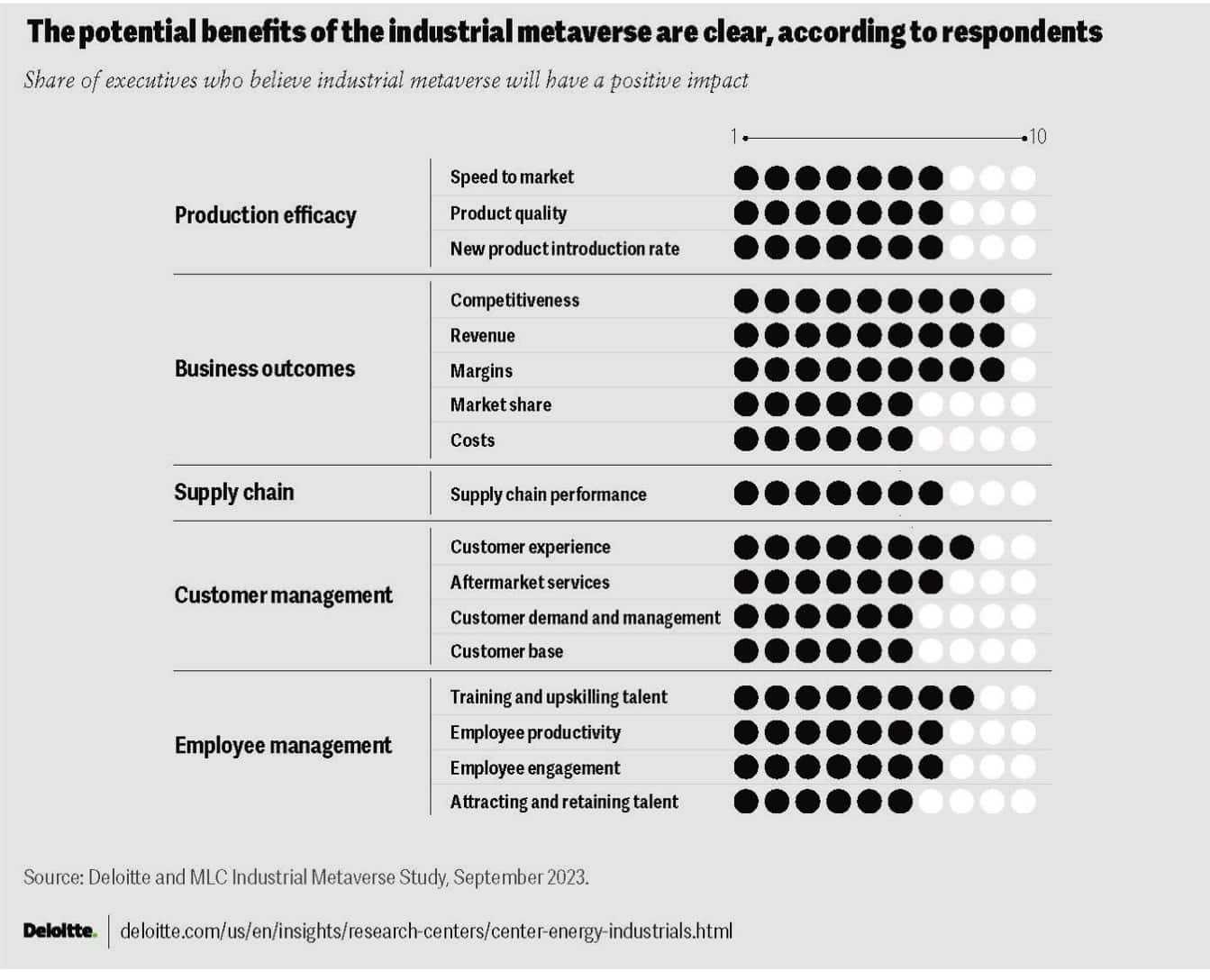
Surveyed executives generally agreed that the industrial metaverse offers new ways to solve a variety of pressing challenges they face in the near term, such as attracting and retaining top talent, and building visibility and resilience into their supply chains (figure 1). They tend to view the industrial metaverse as a pathway to future value realization through improved new product introduction rates and new customer experiences and services. Respondents also expect a broad positive impact across the business and are confident that the industrial metaverse will improve key business outcomes such as competitiveness, market share, revenue, and costs, among others.
However, the study results indicate that manufacturers aren’t just betting on the future, they seem to be building it. Some respondents shared that they have already made significant investments in metaverse initiatives, and nearly three quarters plan to increase their investments over the next 1–3 years (figure 2).
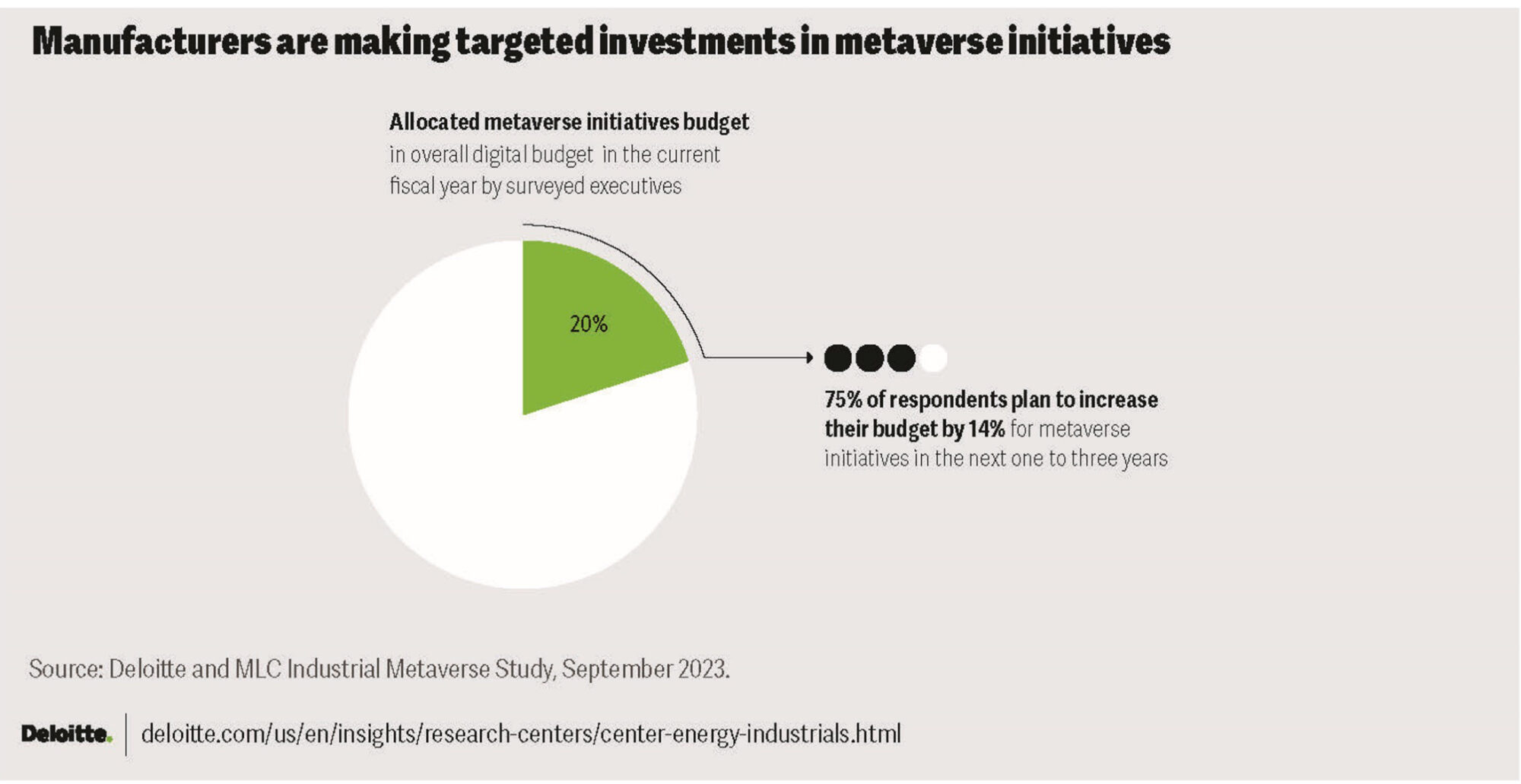
Building on Smart Factory Momentum
Through digital transformation, smart factory solutions have generally allowed companies to collect important data from their processes, products, assets, and operators and perform advanced analyses to generate valuable insights, and then augment human intelligence with machine intelligence to implement significant and sustainable improvements. These advancements have resulted in greater asset efficiency, enhanced product quality, reduced costs, and increased safety and sustainability.[ii]
In a previous Deloitte paper that focused on how manufacturers can derive value from smart factory technologies,[iii] four primary ecosystems were introduced: production (quality sensing, factory asset intelligence, product development, etc.), supply chain (supply network mapping, digital warehousing, control towers, etc.), customer (aftermarket services, virtual product experiences, etc.), and talent (recruiting, training, etc.).[iv] Within the production ecosystem, a set of eight use cases were introduced, aptly named the “Great 8,” as the most prevalent use cases for smart factory technologies that manufacturers are operationalizing. Because of the scope of what the industrial metaverse can offer—connection to data-rich, immersive 3D environments from anywhere there is a broadband internet connection—its potential value stretches far beyond just the production ecosystem and the Great 8 use cases.
The manufacturing industry appears well-positioned for the adoption of the industrial metaverse. Given their continued focus on digital transformation and their journey toward the smart factory, the majority of companies surveyed have made significant investments and are already using the foundational technologies that power the industrial metaverse. Companies are generally either implementing technologies like data analytics, cloud computing, AI, 5G, and Internet of Things technologies across multiple projects and processes, or they are currently experimenting with one-off projects (figure 3). The same is true for digital twins, 3D modeling, and 3D scanning, which can all serve as building blocks for the immersive 3D environments of the industrial metaverse.
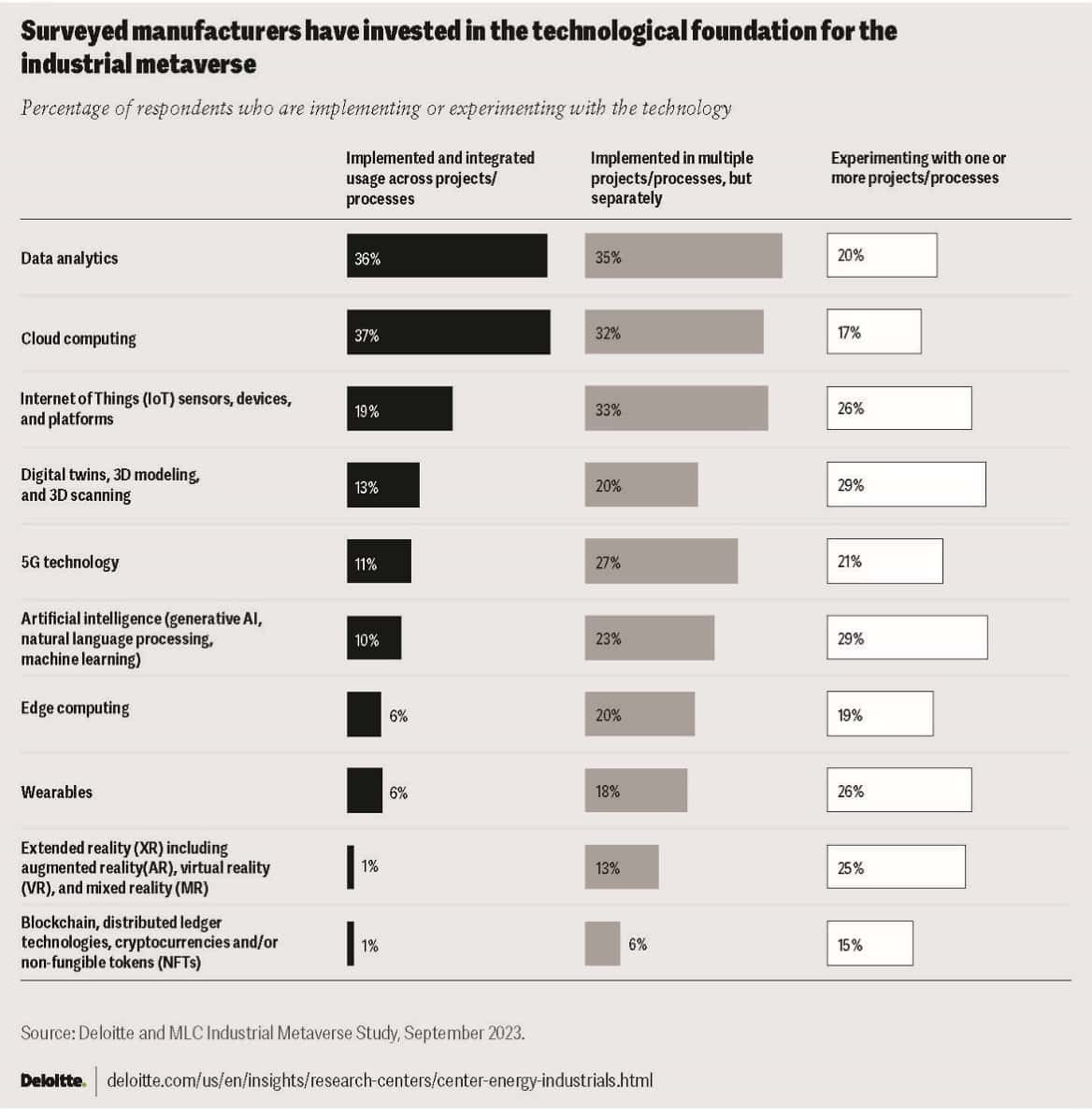
The study shows that not only do most manufacturers seem to have a strong technology foundation in place, many of the surveyed respondents are already combining and leveraging these technologies today to implement industrial metaverse use cases and create value.
Manufacturers Appear to be Driving Toward Adoption
Nearly all (92%) of surveyed executives said that their company is experimenting with or implementing at least one metaverse-related use case and, on average, they are currently running more than six. Building on their smart factory efforts and leveraging the foundational technologies already in place, the production ecosystem was the most common for use case implementation, with more than one-third of respondents already integrating metaverse technologies, followed by the customer, supply chain, and talent ecosystems (figure 4).
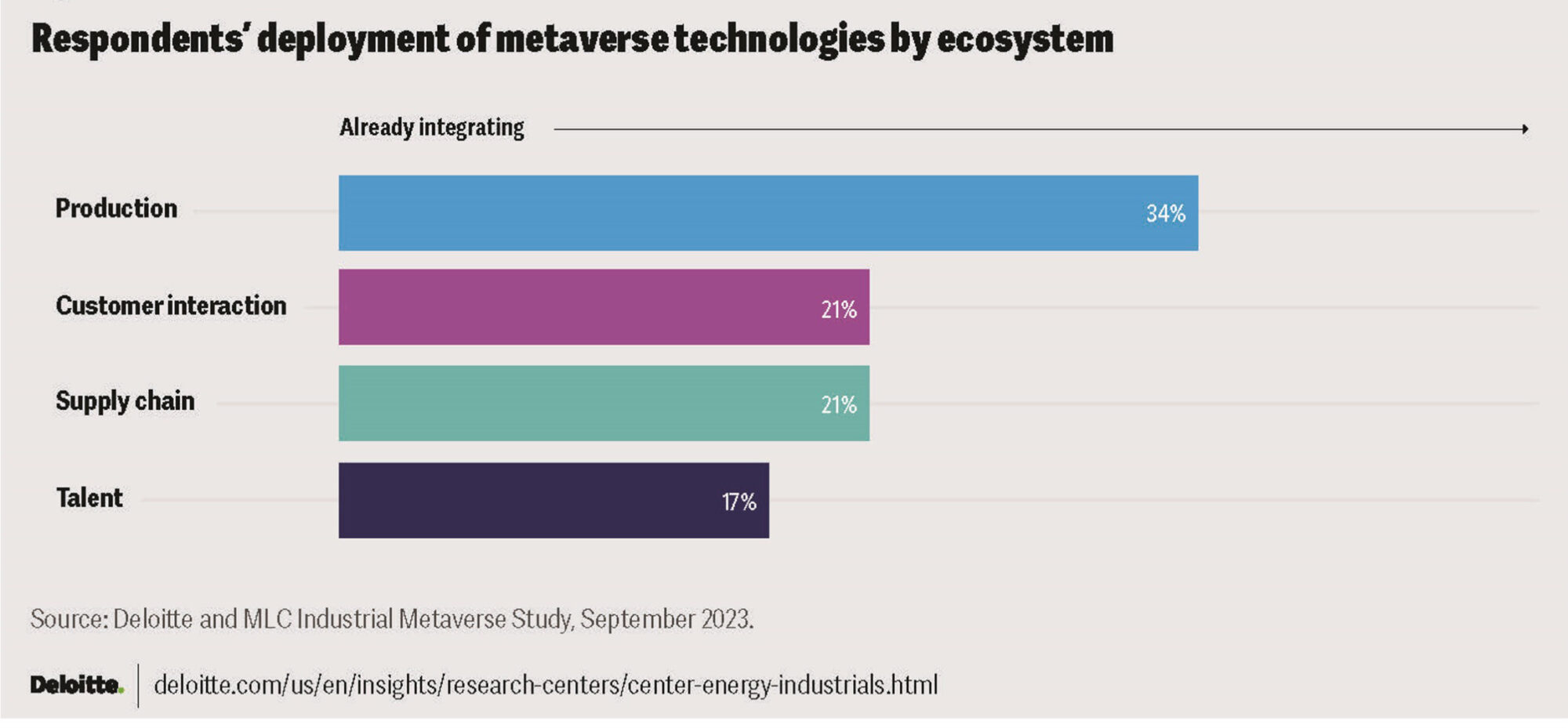
Respondents then shared the primary use cases they are implementing using metaverse technologies. The study provides the complete details about these use cases, including their definitions, prevalence of implementation amongst surveyed respondents, the primary benefits derived, and some examples of use cases in action. Process simulation and real-time monitoring/digital twin were the two most common use cases overall, and the remaining production-focused use cases were also prevalent. Immersive training ranked third, followed by supply chain management and immersive customer experiences, demonstrating a healthy distribution of use cases across the talent, supply chain, and customer ecosystems.
The use cases and case examples that companies have reported seem to demonstrate that manufacturers are deriving value today from implementing industrial metaverse initiatives. However, they may still feel that there are challenges and risks to overcome to move toward its full adoption.
Cyber, Data Protection Are Important Risks
Cyberthreats are pervasive and can have a disastrous effect on a company if not properly mitigated. Implementing the industrial metaverse will likely bring new challenges since it derives its unique power from making proprietary 3D data about parts, products, facilities, etc., available to a variety of internal users, customers, and suppliers. It does this by allowing users to access the data through a myriad of interaction technologies over the internet, such as AR/VR devices, tablets, and phones.
One executive mentioned that because the metaverse will require significant data management; data protection, privacy, and security is a concern.[v] In fact, more than 70% of the respondents agree that cybersecurity is one of the greatest risks associated with implementing metaverse-enabling technologies (figure 5). Rounding out the top four are respondents’ concerns about protecting data and IP, brand, and personal information, all of which can be compromised in a cyberattack.
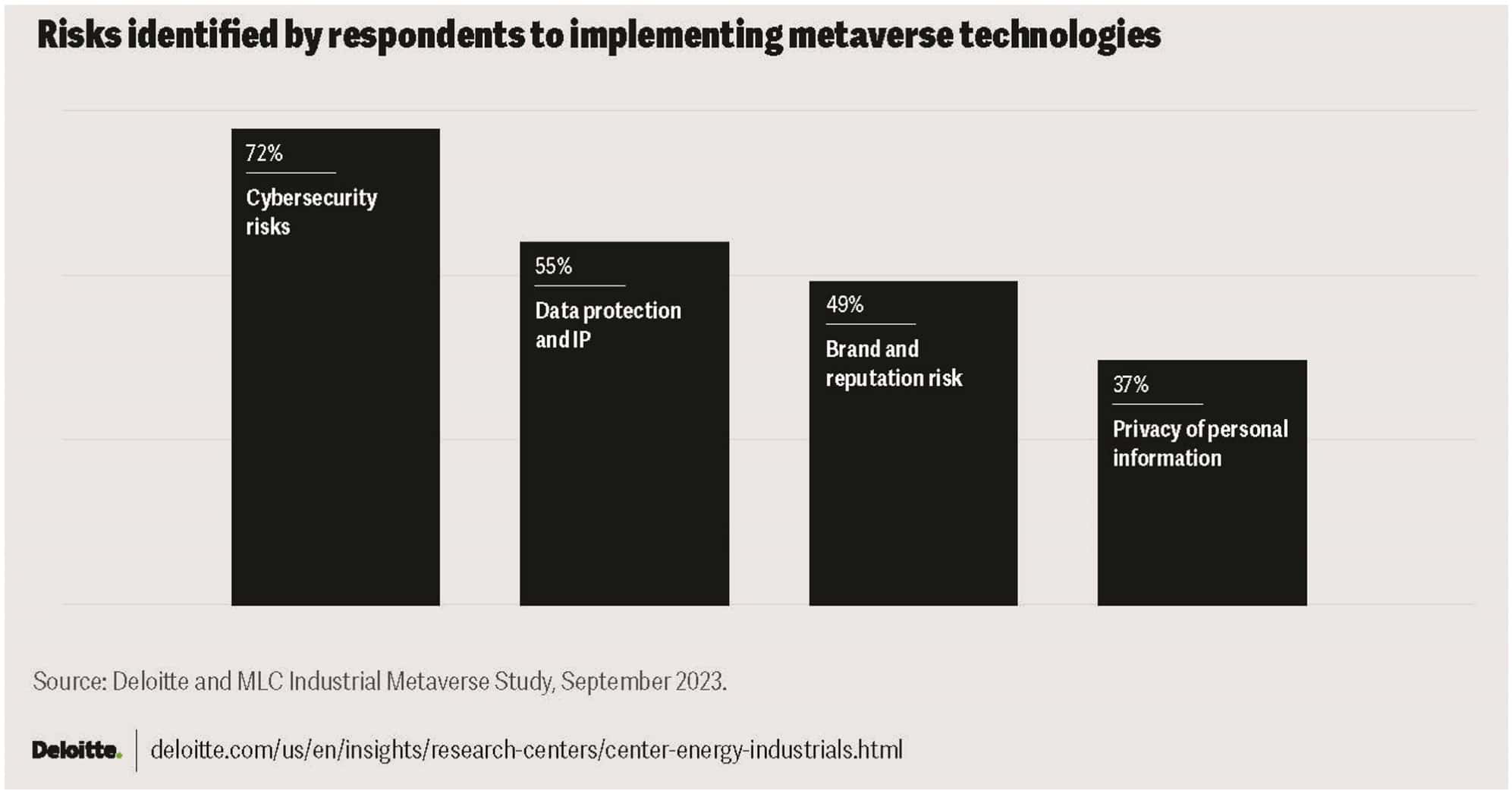
Digitalization has required manufacturers to drive collaboration between informational technology and operational technology to create an effective cybersecurity approach.[vi] Companies should develop capabilities to identify and address risk in an information technology (IT)–operational technology (OT)–interaction technology (ET) environment. One executive explained that his company is working to establish OT security capabilities and standards for how to review equipment efficiently, following the company’s IT policies, so that the operations and engineering teams can more quickly pilot and implement new equipment. This includes ET, especially since they are typically low cost (<$5,000) and don’t rise to the same level of review priority for IT as, say, a muti-million-dollar software package.[vii]
While cybersecurity risk may increase with the industrial metaverse, the study suggests that manufacturers generally believe the value it will deliver outweighs the risk, especially with the right mitigation strategies in place.
Unleashing the Power of the Industrial Metaverse
The 2023 Deloitte and MLC Industrial Metaverse study indicates that manufacturing executives seem not only confident that the industrial metaverse may hold great promise for the industry – some are already taking what’s next and transforming it into what’s now. In many cases, they are driving forward with metaverse use cases and appear to be deriving significant value across the organization. The study identifies a three-pronged approach that can be used by a broad spectrum of companies to identify, initiate, and scale industrial metaverse initiatives.
About the authors:

Paul Wellener is a Principal within the US Industrial Products & Construction practice with Deloitte Consulting LLP. He has more than three decades of experience in the industrial products and automotive sectors and has focused on helping organizations address major transformations.

John Coykendall is a vice chair, Deloitte LLP, and the leader of the US Industrial Products & Construction practice. John has more than 25 years of consulting experience focusing on global companies with highly-engineered products in the A&D, Industrial Products and Automotive industries.

Kate Hardin, executive director of Deloitte’s Research Center for Energy and Industrials, has worked in the energy industry for 25 years. She leads Deloitte’s research team covering the implications of the energy transition for the industrial, oil, gas, and power sectors.

John Morehouse is the research leader for industrial products manufacturing in the Deloitte Research Center for Energy & Industrials. He has over 25 years of experience in manufacturing-related roles in industry, academia, and government.
David R. Brousell is the founder, vice president and executive director the MLC.
[1] On behalf of Deloitte and the MLC, an independent research company conducted an online survey of over 350 senior executives in the US manufacturing industry in May 2023. The survey findings were supplemented by a series of executive interviews with technology leaders in the industry conducted in June 2023.
[i] Deloitte analysis of the Deloitte and Manufacturing Leadership Council (MLC) Industrial Metaverse survey, 2023.
[ii] Deloitte, “Smart Factory for Smart Manufacturing,” accessed August 18, 2023.
[iii] Paul Wellener et al., Accelerating smart manufacturing, Deloitte Insights, 2020, p. 6.
[iv] Ibid
[v] Insights gleaned from manufacturing executives’ interviews conducted in June 2023.
[vi] Ibid
[vii] Ibid